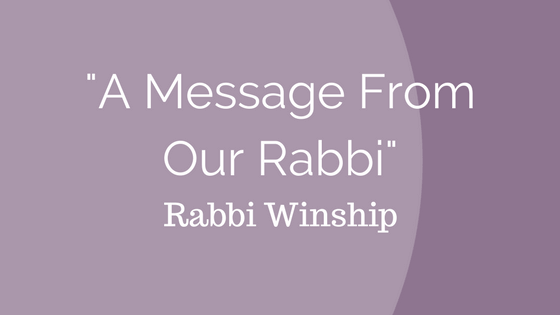Dear TBD Community,
I hope that this note finds you well. I am writing in an effort to reach out and share some of my thoughts with you beyond the bimah. I will reach out periodically to share with you in this way and hope that these words will inspire many deep conversations when we see one another again.
This month, at the beginning of a season that is filled for so many of us with encounters with religions not our own, I wish to speak with you about what we mean by interfaith inclusion here at Temple Beth David. As with all things, we will delve into text and hopefully emerge with a clearer sense of the questions we must answer in order to define ourselves and our relationships to NonJews.
Judaism, from the Bible onwards, has always had a clear sense of the Jews’ special relationship with God. Yet, despite the near-constant refrain of this uniqueness amongst the nations, it is also clear, through our Biblical texts, that God should be viewed as a God with special relationships with the other nations. (Whether it is the Non-Jews who have prophetic abilities or the nations and cities God pays heed to, it is clearly not just the Jew who has a relationship to God.)
The same as the Jewish nation sits as the protagonist in our story with God, so too do the other nations serve as protagonists in their own journeys with God. However they may choose to describe and name that higher power, it is with God, our God, that they hold their relationship. As it is written in Amos 9:7
ֲה֣לֹוא ִכ ְבנֵ֩י ֻכ ִשִּ֨יִים ַא ֶֶּ֥תם ִִ֛לי ְבֵֶּ֥ני יִ ְשָרֵֵ֖אל נְֻאם־יְהָָ֑וה ֲה֣לֹוא ֶאת־יִ ְשָר ֵֵ֗אל ֶהֱע ֵֵ֙לי ִתֵ֙י ֵמֶ֣אֶרץ ִמ ְצַיריִם פּ ְְ ִל ְש ִתִֶּ֥יים ִמ ַַּ ְְֵ֖תֹור וֲַאֶָּ֥רם ִמִ ִּֽיר
To Me, O Israelites, you are just like the Ethiopians —declares the LORD. True, I brought Israel up from the land of Egypt, but also the Philistines from Caphtor and the Arameans from Kir.
Whether it is our journey from Egypt or the other nations from their places of torment to their homelands, God features as the uplifter from bad to good. So, in seeing that we have a common Guide and Friend, but knowing the deep history of pain that sits between Jew and Non-Jew, what are we to do? Here, again, we turn to text to help guide us. As it says in the Talmud on Gittin 61a:
אין ממחין ביד עניי נכרים בלקט בשכחה ובְאה מְני דרכי שלום: ת”ר מְרנסים עניי נכרים עם עניי ישראל ומבקרין חולי נכרים עם חולי ישראל וקוברין מתי נכרים עם מתי ישראל מְני דרכי שלום: §
The Mishna teaches: One does not protest against poor gentiles who come to take gleanings, forgotten sheaves, and the produce in the corner of the field, which is given to the poor [pe’a], although they are meant exclusively for the Jewish poor, on account of the ways of peace. Similarly, the Sages taught in a baraita (Tosefta 5:4): One sustains poor gentiles along with poor Jews, and one visits sick gentiles along with sick Jews, and one buries dead gentiles along with dead Jews. All this is done on account of the ways of peace.
We help them as if they were in our community, on account of the ways of peace. We give them charity, care for their sick, and bury their dead. And why? What does it really mean, “the ways of peace?” Well, as some who read this will say, for much of time it perhaps meant, “so we don’t get in trouble with them,” or, “so they don’t hurt us.” Others will immediately turn to the words of Proverbs 3:17, “Her ways are pleasant ways, And all her paths, peaceful.” and claim that “the ways of peace” must, of course, be referring to the entire Torah, whose ways and paths are all peaceful. But, I wish to push you a step further than the dichotomy that lays between these two ideas. I want to push you to ask the good Jewish question, “What is the fitting way forward for me and for us as a religion, now, in our day?”
When presented with the question of engaging with, the question of being in community with the other, the Non-Jew, we must affirm that what our religion demands of us is to find a way forward that is a way of peace. In defining what is a fitting relationship, it will be important for us to admit to the differing types of peace we might be pursuing. Is this a peace of isolation where we ask the other to leave us alone? Is this a peace of tolerance in which we live with but do not engage with the other? Or, is the peace we desire a peace of interconnectivity, one built out of and to support communities where many become one?
It is my belief, that here at TBD, the peace that is fitting for us to engage in is a peace of interconnectivity. One in which we reach out to the other and understand, that though we speak different languages, born out of differing histories, we can come to understand each other through the universal language of God and ethics. As is often the case, Rabbi, Lord Jonathan Sacks said it best in The Dignity of Difference:
“The radical transcendence of God in the Hebrew Bible means nothing more nor less than that there is a difference between God and religion. God is universal, religions are particular . . . In the course of history, God has spoken to mankind in many languages: through Judaism to Jews, Christianity to Christians, Islam to Muslims… Fundamentalism, like imperialism, is the attempt to impose a single truth on a plural world. It is the Tower of Babel of our time. The test of faith is whether I can make a space for difference. Can I recognize God’s image in someone who is not in my image, whose language, faith, ideals, are different from mine?”
We are all made in the image of God, yet have different conceptions of God or even if God. Our differing views of these deep theological questions have caused us the pain of misunderstanding and suffering for far too much of our histories. To make peace now is to engage with. As a liberal Jewish congregation, we are called to reach out, in the same way, we would to those in our own family, and to ask, “Can I recognize community in someone who is not in my image, whose language, faith, ideals, are different from mine?”
B’shalom,
Rabbi David Winship
Temple Beth David of the South Shore




